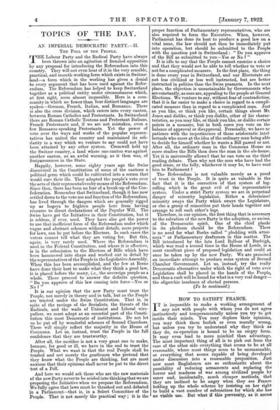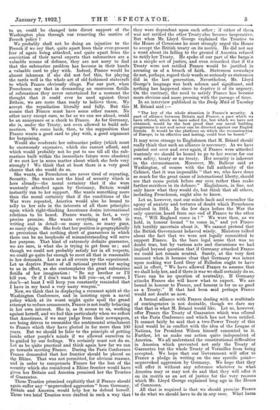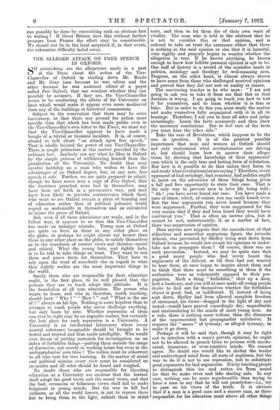HOW TO SATISFY FRANCE.
1 T is impossible to make a working arrangement of • any sort with people with whom you do not agree instinctively and temperamentally unless you try to get inside their minds. You may deplore their opinions, you may think them foolish or even morally wrong, but unless you try to understand why they think as they do, co-operation is bound to be an empty form. It may even lead to more mischief than advantage. The most important thing of all is to pick out from the case of the other side everything that seems to be at all reasonable, where most things seem to be unreasonable, or everything that seems capable of being developed under discussion into a reasonable proposition. Just now most Englishmen are so enthusiastic about the possibility of reducing armaments and replacing the horror and madness of war among civilized people by saner and, incidentally, much cheaper methods, that they are inclined to be angry when they see France holding up the whole scheme by insisting on her right to build a vast number of submarines for which she has no visible use. But what if this perversity, as it seems to us, could • be changed into direct support of the Washington plan through our removing the motive of French policy ? We probably shall not be doing an injustice to the French if we say that, quite apart from their ever-present fear of again being attacked, and quite apart from the conviction of their naval experts that submarines are a valuable means of defence, they are not sorry to find that the submarine problem has become in their hands a valuable card to play with. Indeed, France would be almost inhuman if she did not feel this, for playing the cards well is the whole art of old-fashioned statecraft to which France obviously clings. For our part, when Frenchmen say that in demanding an enormous flotilla of submarines they never entertained for a moment the thought that it could ever be used against Great Britain, we are more than ready to believe them. We accept the repudiation literally and fully. But this means that France must have some other reason. No other navy except ours, so far as we can see ahead, could be an annoyance or a check to France. As for Germany, she is, under the Treaty, not even allowed to build sub- marines. We come back, then, to the supposition that France wants a good card to play with, a good argument for bargaining. Would she moderate her submarine policy (which must be enormously expensive, which she cannot afford, and which would probably not be put to use till all the sub- marines built within the immediate future were obsolete) if we met her in some matter about which she feels very strongly ? We think that at least there is a very good chance that she would do so.
She wants, as Frenchmen are never tired of repeating, Security. She wants not the kind of security which is hers already—the moral • certainty that if she were wantonly attacked again by Germany, Britain would instantly run to her support. She wants something more than the moral certainty that if the conditions of the War were repeated, America would also be bound to rally to her side in the interests of all those principles upon which right-thinking Americans desire international relations to be based. France wants, in fact, a very precise promise. She wants everything set forth in writing and in detail—so many men, so many guns, so many ships. She feels that her position is geographically so precarious that nothing short of guarantees in which there can be no loophoole of misunderstanding will serve her purpose. That kind of extremely definite guarantee, we are sure, is what she is trying to get from us ; and though we could not probably satisfy her in all respects, we could go quite far enough to meet all that is reasonable in her demands. Let us at all events try the experiment.
Let us deprive France of all rational pretext for saying to us in effect, as she contemplates the great submarine flotilla of her imagination : Be my brother or I'll kill you. Or if I don't want to kill you—as, of course, I don't—at least I will keep you constantly reminded that I have in my hand a very nasty weapon." Now, we think that in displaying a recusant spirit at the Washington Conference, and in insisting upon a naval policy which at its worst might quite spoil the grand attempt to reduce armaments, France is not really behaving in her own interest. She is, as it seems to us, • working against herself, and we feel this particularly when we reflect that Americans, if we may judge from their newspapers, are being driven to reconsider the sentimental attachment to France which they have gloried in for more than 100 years. But we should be false to the principle of getting inside other people's minds if we allowed ourselves to be guided by our feelings. We certainly must not do so. Let us be quite practical and think again how far we can go towards meeting France. During the Paris Conference France demanded that her frontier should be placed on the Rhine. That was not permitted, for obvious reasons, and in order to compensate France for the loss of the security which she considered a Rhine frontier would have given, her Britain and America promised her the Treaties of Guarantee.
Those Treaties promised explicitly that if France should again suffer any unprovoked, aggression " from Germany, Britain and America would help her.- to defend herself. These two brief Treaties were drafted in such a way that they were dependent upon each other ; if either of them was not ratified the other Treaty also became inoperative. But when Mr. Lloyd George explained the Treaties to the House of Commons he most strongly urged the House to accept the British treaty on its merits. He did not say a word about its falling to the ground if America refused to ratify her Treaty. He spoke of our part of the bargain as a simple act of justice, and even remarked that if tie Treaty were not ratified France would be justified in accusing us of a breach of faith. Statesmen nowadays do not, perhaps, regard their words so seriously as statesmen did in the last generation. Nevertheless, Mr. Lloyd George's language was both solemn and significant, and nothing has happened since to deprive it of its urgency. On the contrary, the need to satisfy France has become more obvious and more pressing with the passage of time. In an interview published in the Daily Mail of Tuesday M. Briand said :— " The key of the whole situation is France's security. A pact of alliance between Britain and France, a pact which we have offered, which we have asked for, but which we have not obtained, would be the best proof that our naval building programme is not and never can be directed against our English friends. It would be the platform on which the reconstruction of Europe, to be effective and lasting, could best be based."
It may seem strange to Englishmen that M. Briand should really think that such an alliance is necessary. As we have pointed out over and over again, if France were attacked wantonly we should be bound to go to her rescue for our own safety, treaty or no treaty. Her security is inherent in the circumstances. Moreover, Mr. Balfour said at Washington, of course with the full authority of the Cabinet, that it was impossible "that we, who have done so much for the great cause of international liberty, should see that cause perish before our eyes rather than make further sacrifices in its defence." Englishmen, in fine, not only know what they would do, but think that all others, including Frenchmen, ought also to know.
Let us, however, cast our minds back and remember the agony of anxiety and tortures of doubt which Frenchmen endured in 1914. In the few days before the War the only question heard from one end of France to the other was, Will England come in ? " We were then, as we hold, in honour bound " to come in," and yet France felt terribly uncertain about it. We cannot pretend that the British Government behaved wisely. Ministers talked about the fact that we were not legally committed to support France. In the bare legal sense that was no doubt true, but by various acts and discussions we had implied beyond question that if Germany attacked France we could not remain neutral. Surely, at the very first moment when it became clear that Germany was intent upon making war Lord Grey of Fallodon ought to have said in effect, " We have allowed France to assume that we shall help her, and if there is war we shall certainly do so. There can be no question of neutrality. If Germany attacks France she will know what to expect. We are bound in honour to France, and honour is for us as good as a Treaty." If that had been said perhaps France would not doubt us now.
A formal affiance with France dealing with a multitude of contingencies is not desirable, though we dare say that that is what M. Briand would like. Let us, however, offer France the Treaty of Guarantee which was offered at the Paris Conference and which has not been ratified. It cannot fairly be said that a two-Power Treaty of this kind would be in conflict with the idea of the League of Nations, for President Wilson himself consented to it. Further, let us make our action quite independent of America. We all understand the constitutional difficulties in America which prevented not only the Treaty of Guarantee but the whole Treaty of Versailles from being accepted. We hope that our Government will offer to France a pledge in writing on the one specific point— unprovoked aggression by Germany. We hope that they will offer it without any reference whatever to what America may or may not do and that they will offer it on its merits as an act of justice for the very reasons which Mr. Lloyd George explained long ago in the House of Commons. All that is required is that we should promise France to do what we should to do in any case. What liana can possibly be done by committing such an obvious fact to writing ? If Great Britain does this without further pressure from France the effect may be considerable. We should not be in the least surprised if, in that event, the submarine difficulty faded away.












































 Previous page
Previous page